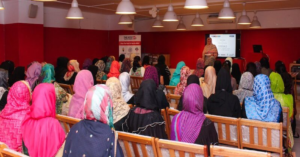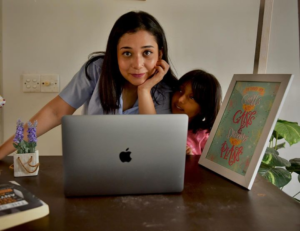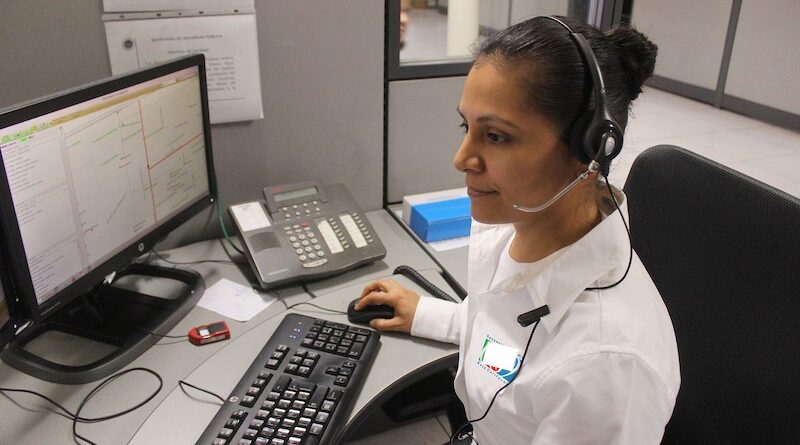While Pakistan is going through severe economic and political turmoil at the moment, a small ray of sunshine in all this gloom and doom is the rapidly advancing tech sector of the country.
Historically, women in Pakistan had to deal with numerous obstacles when venturing into the workplace. Cultural and traditional norms, patriarchy, and a long-running history of the narrative that “women don’t belong in the workplace” have hindered women’s empowerment for decades leaving the country behind in various sectors.
However, things are changing for the better, albeit slowly.
Recent years have witnessed a remarkable transformation as an increasing number of women are not only venturing into the tech sector but also excelling in it. We have remarkable female leaders in the industry who are working towards inclusion, and diversity. As well as launching programs that help both beginner and professional women in tech equip themselves with the latest tech skills.
Women-Driven Tech Education in Pakistan
In Pakistan, several programs are spearheading the inclusion of women in tech, such as CaterpillHers and CodeGirlsPakistan. Both programs are women-led and for women, working towards empowering women and equipping them with technical skillsets that would allow them to form a career and achieve financial independence.
There are also countless online communities like WomeninTechPK, Superwomen of Pakistan, and Techgeeks led and moderated by women forming safe spaces for discussion and dialogue.
Faiza Yousuf, founder of WomenInTechPK and CodeGirls spoke about the difficulties women in Pakistan face when trying to enter the tech sector and how she along with several others is working towards inclusion and gender parity in tech:
“At WomenInTechPK, CodeGirls, and CaterpillHERs, we can closely examine what makes it difficult for women to get into tech and then stay in it. We see patterns evolving, including not getting into tech education due to limited resources spent on girls, stereotyping, not having access to infrastructure, not having access to role models and mentors, lack of public transportation and measures for women’s safety, cultural restrictions, and burden of the majority of the care work.
When it comes to staying in tech, we see burnout, unsupportive organizational policies, gender stereotyping and discrimination in hiring and promotions, wage gap, lack of leadership and mentoring programs, and hostile work environment.
There is a lot that needs to be done on all levels, which is why we see organizations like WomenInTechPK, Pakistani Women In Computing, CodeGirls, Circle, and CaterpillHERs leading the way in giving access to all the necessary resources to aspiring and existing women technologists in Pakistan. We also see companies like 10Pearls, ArbiSoft, Contour Software, and S&P Global, who are committed to hiring and retaining more women by creating gender-inclusive policies. But some things need to be changed on a societal level, and for that, we need more allies who can help us change the narrative and bridge the gender gap in Pakistan’s tech ecosystem.”

CodeGirls TechFest 2022 Photo from WomeninTechPk
Shamim Rajani COO of Genetech Solutions and Co-Founder of CodeGirls talked about the impact of CodeGirls and her advocacy for inclusion in tech:
“Code Girls came into being with one goal in mind – to empower women and improve gender parity in Pakistan’s tech industry. At the moment, only 29% of the people employed in the IT sector are women, and we are constantly advocating for better inclusion ratios. We provide women with a personalized and direct path to a software engineering career and equip young girls with enough skills to help them become financially independent. With over 950 graduates and 300+ industry placements, we are proudly the leading community-funded coding boot camp for young women in Pakistan. The support we have received is immense and encourages us to aim higher. Upwards and onwards!”

Shamim Rajani & Faiza Yousuf founders of CodeGirls Photo from WomeninTechPk
Women Leading the Freelance Wave in Pakistan
In Pakistan, freelancing has been getting more and more popular since the pandemic. The number of freelancers working professionally is growing rapidly with women being a major part of this force. This is due to the ease and safety remote-working offers.
Platforms like Upwork, Freelancer, and Fiverr enable talented Pakistani women to offer their diverse skills and services to clients worldwide. These enterprising women are breaking down barriers, and embracing opportunities in varying fields like graphic design, development, consultancy, project management, content creation, and more. Not only are they contributing to Pakistan’s economic growth, but they are also setting inspirational examples for future generations of women.
This year, CaterpillHERs, a career accelerator program, joined forces with Upwork to offer participants access to coaching in the Upwork Academy. The academy provides valuable career insights, upskilling opportunities, and educational resources for freelancers across the globe.
Women-Led Startups Transforming Pakistan
Women-led startups are playing a pivotal role in Pakistan’s entrepreneurial landscape. Despite facing challenges such as limited access to funding and resources, these startups have harnessed innovation and technology to confront a diverse array of issues spanning healthcare, education, e-commerce, and sustainability.
As Varah Musavvir, a Social Entrepreneur, Founder of The Crafter’s Guild, and Creative Director of Firefly, aptly points out, “Curating communities has had exponential growth online. But staying true to their presence offline through events or creating a safe space for creatives back on the web is not everyone’s Forte. Every online platform promises to thrive for the maker, artist, and crafter in Pakistan. Very few, however, understand the setbacks, struggles, or even needs at hand for the running of e-commerce initiatives, not just for handmade businesses but home-based ventures led by women specifically.”
Farhat Bashir, the visionary Founding CEO of Seerab Technologies, has become a trailblazer in breaking down barriers and reshaping the entrepreneurial landscape. She reflects on her journey, stating, “As a tech entrepreneur who’s broken barriers in two traditionally male-dominated fields, I’ve forged my path and motivated others to chase their aspirations. It has been a challenging journey that has honed my determination, allowing my talent to shine and my resilience to soar. I strongly believe that today’s world of innovation is gender blind, offering boundless opportunities to those who dare to redefine the blueprint of success, pioneering an innovative concept in a traditionally conservative industry like Real Estate presented a fair share of challenges. However, I confronted these obstacles head-on, demonstrating my leadership prowess and carving out a distinct place for myself in what was previously an exclusive men’s domain.”
While these women-led startups are reshaping industries and inspiring a new generation of entrepreneurs, they also challenge the established dynamics of tech startup success. As Musavvir mentions, “In the tech startup scene, you either know the right people or no one at all. It can make one feel like there’s a lot of bias, and at times it can also be cumbersome when you realize you don’t have all the resources to catapult at the pace and scale you’d want to. Dynamics of tech startup success or rather any business rely on numbers and profits, not necessarily social impact, which can be sad measures or calibrations for success.”
These stories reflect not only the challenges faced but also the resilience and determination of these women entrepreneurs, highlighting that success goes beyond profits and numbers—it encompasses the profound social impact they are making on Pakistan’s entrepreneurial landscape.
Challenges Hindering Women’s Progress in Pakistan’s Tech Sector
This new tech wave has given rise to many new and innovative ideas, leading to the creation of startups and tech-driven businesses. In fact, from 2018 to 2022, several Pakistani startups managed to secure an amazing $831.2 million in funding. While this number is admirable, there is one sad reality to this, When we look more closely at that funding, we find that startups run by women received a very small portion of it, just $9.8 million, which is only about 1.12 percent. And it got even worse last year, dropping to just 0.88 percent. This shows that women in the tech industry are facing some serious challenges.
Let’s highlight some of the key factors affecting women in the workplace:
- Cultural Norms and Societal Expectations:
Pakistan’s conservative societal norms and traditional gender roles often discourage women from pursuing careers in technology. Many families prioritize traditional roles for women, such as homemaking, which can limit opportunities for female tech enthusiasts. Breaking free from these expectations can be a daunting task.
- Educational Disparities:
Gender disparities in access to quality education persist in Pakistan. While girls’ enrollment in schools has improved, they still face challenges in accessing STEM (Science, Technology, Engineering, and Mathematics) education.
- Workplace Discrimination:
Gender bias and discrimination within tech workplaces remain major obstacles. Women often face unequal pay, fewer leadership opportunities, and biases in hiring and promotion processes. The absence of supportive policies and an inclusive work environment can deter women from pursuing or staying in tech careers.
- Work-Life Balance:
Balancing work and family responsibilities can be especially challenging for women in Pakistan. The expectations of managing both household duties and a demanding tech career can lead to burnout and hinder career advancement.
- Access to Funding and Resources:
For women entrepreneurs and startups in the tech sector, securing funding and resources can be an uphill battle. Investors may be hesitant to invest in women-led ventures, resulting in limited access to capital for business growth.
- Online Harassment and Safety Concerns:
Women working in online spaces, including freelancers and digital content creators, often face harassment and safety concerns. Cyberbullying and online threats create a hostile working environment, discouraging many women from fully participating in the digital realm.
While there are many challenges Pakistani women in the workforce face, many women still persevere despite all odds. Who succeeded in the industry and made a significant impact overcoming hardships and adversity with grace.

Nida Saif Founder Superwomen of Pakistan
Nida Saif, who is a marketing manager, a mother, and a community leader is one such woman. While talking about building a career and juggling motherhood she said,
“My message has always been that women, especially young mothers, need to remind themselves of the power they carry within them! Much like how I never want to regret not pursuing my dreams because of my children, I advocate the same for women who struggle to prioritize themselves and, most importantly, their neglected passions. I know that it’s easier said than done, we live in a very patriarchal society. It’s hard to break barriers and even harder to stick to that path. However, when you’re dedicated to your goal of financial independence and making a living by doing what you love, then you find the strength to overcome all challenges. You have the power to shape your life as you see fit, even if it means choosing to be a stay-at-home mother and not pursuing a career.”
Women Breaking Barriers
Pakistan’s tech sector has witnessed a remarkable surge in innovation and transformation, and at the helm of this revolution is a group of exceptionally talented and visionary women. These trailblazers are breaking barriers, challenging stereotypes, and pioneering groundbreaking initiatives that are reshaping the country’s tech landscape.
Their contributions span a wide spectrum, from entrepreneurship and digital rights advocacy to software development and social impact ventures.
Here’s the list of some notable women (ed: and not limited to the below) in Pakistan’s tech sector who are spearheading change, illuminating a path forward for the industry, and inspiring countless others along the way.
- Amna Batool: The pioneering Founder behind Asqurr, a startup leveraging artificial intelligence to streamline customer service operations for businesses.
- Azima Dhanjee: Co-Founder ConnectHear working towards empowering the deaf community through technology.
- Faiza Yousuf: Co-Founder and CPO of Koi.Work and CaterpillHERs, Co-founder WomenInTechPK and CodeGirls Product Management Consultant.
- Hira Saeed: Founder and CEO of Koi.Work, a platform connecting vetted talent with remote-first businesses, and CaterpillHERs, an organization committed to empowering and advancing women in tech and entrepreneurship.
- Jehan Ara: Founder of Nest I/O, former President of the Pakistan Software Houses Association for IT and ITES (P@SHA), at the forefront of representing Pakistan’s software and IT services industry.
- Maria Umar: The driving force behind Women’s Digital League, a social enterprise offering online work opportunities and empowerment for women in Pakistan.
- Nighat Dad: A trailblazer as the Founder of the Digital Rights Foundation, a non-profit committed to safeguarding digital rights and freedom of expression.
- Sadaffe Abid: A driving force behind CIRCLE, a socially conscious enterprise dedicated to advancing women’s economic participation in Pakistan.
In the heart of Pakistan’s evolving tech sector, a profound transformation is unfolding—one that transcends the trials and tribulations of our time. It’s a narrative of resilience, determination, and unwavering hope. Despite the odds stacked against them, the women of Pakistan are scripting a story of empowerment, inclusion, and gender parity that resonates far beyond the digital realm.
As we celebrate these remarkable women who are leading the charge, we’re reminded that progress isn’t measured merely by statistics or funding figures. It’s etched in the stories of mothers who pursue their dreams, in the voices that refuse to be silenced, and in the unwavering belief that opportunities should be boundless and barriers surmountable.
In the face of cultural norms, educational disparities, workplace discrimination, and societal expectations, these women emerge as beacons of inspiration. They don’t just break barriers; they shatter them. They defy stereotypes, challenge the status quo, and embrace change with grace.
They prove that innovation knows no gender, that technology is a great equalizer, and that progress is unstoppable when we stand united. Their journey is a testament to the indomitable spirit of women in Pakistan and a beacon of hope for a future where diversity and inclusion aren’t just ideals but fundamental principles that propel our nation to greater heights.
This article has been lightly edited for clarity.
Image by Ernesto Eslava from Pixabay
Rimsha Salam is a tech-enthusiast, writer, blogger, ex-quality assurance engineer, and freelancer. She writes on the latest tech trends, gadgets, Information technology, and more. Always eager to learn and ready for new experiences, she is a self-proclaimed tech geek, bookaholic, introvert, and gamer.











